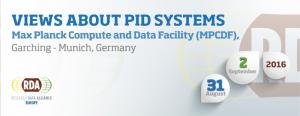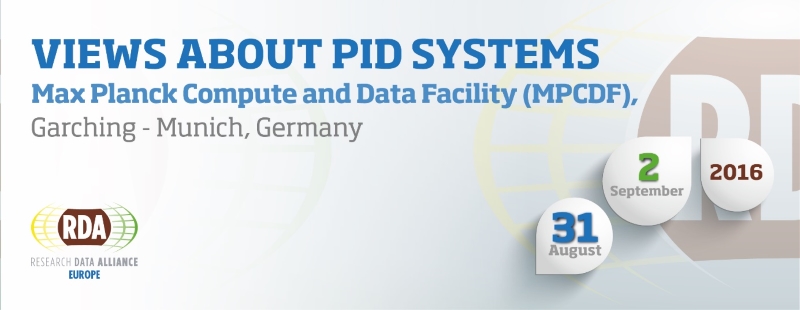
Unique and persistent IDs (PIDs) that can be resolved to meaningful information will be crucial in the digital domain to identify Digital Objects, check their state, refer to them, get access to them, etc. Due to this crucial role it is essential to deploy ultimately stable and robust PID systems allowing users to rely on their existence for many decades. Some experts go even beyond the current usage and see a PID centric data management and access architecture as the way to overcome many severe barriers in the continuously growing data domain. There are still many uncertainties about the role of such PIDs, about which system to choose and about the criteria it should fulfil. This workshop is meant to bring experts together with different backgrounds and from different disciplines to engage in open dialogues in order to openly assess different opinions.
- An open workshop on PID systems
- Preceded by a training course for those interested in learning more and getting detailed information about PID systems and make up their own mind.
The training course runs from 31 August 2016 (11.00) to 1 September (12.00) and the Workshop will start on 1 September 2016 (13.00) until 2 September (16.00).
Both events will be organised at the Max Planck Compute and Data Facility (MPCDF) in Garching/Munich (Germany). Lunch and dinner as well as travel and accommodation costs are self-paid.
Participation is free of charge but subject to on-line registration. Please follow the Training & Workshop links below for further information.
For all the information on the events including all the relevant logistical information please visit here
Call for Papers
Data practitioners are invited to join the workshop and submit abstracts that describe their view on PID systems. The workshop will have short presentations about current practices to set the scene and ensure considerable discussion time. The following list indicates a range of topics for workshop presentation submissions:
1. Which practices of PID usage can we see?
2. Why should one use PIDs in scientific work?
3. What makes the PID system trustworthy enough to invest?
4. What are DOIs and why should one use them?
5. What is the difference between Handles and DOIs?
6. Which other PID concepts are there?
7. Why do some people associate information with PIDs?
Please submit an abstract of max 1 page that describes the type of questions being addressed and/or the type of solutions being chosen.
Submission
If you are interested in submitting a proposal, please use the online submission system of the conference
The deadline for submissions is July 8, 2016. Please have a look at the Call for Paper page for further details
Training Course
The objective of the training course is to inform participants about the usage of PIDs, the systems that are available and services that can be used. By the end of the course, participants will have a good overview enabling them to participate in registering and resolving PIDs for their purposes.
The training course offers both a theoretical (overviews, usage, specifications) section as well as hands-on experience. Various experts will give presentations to help participants obtain a comprehensive overview and practical insight about PIDs and PID systems allowing them to draw their own conclusions. The course will not only include presentations that indicate current usages, but will also cover possible future usages.
The training course runs from 31 August 2016 (10.00) to 1 September (12.00).
For more information on the training course visit here
Workshop
The objective of the workshop is to exchange information about current practices in using PIDs and PID systems and to draw best practice conclusions at the end. In one of the discussions during the RDA EU Science Workshop, participants stated the urgent need for such a workshop (in combination with a training course) to disseminate basic knowledge.
The workshop aims to bring people from various discipline backgrounds together and discuss about advanced usages of PIDs to sharpen understanding and to disseminate current practices. Therefore, different use cases that have exemplary character will be presented and discussed. Plenty of time will be reserved for discussion.
The workshop will start at 1 September 2016 (13.00) and end at 2 September (16.00).

